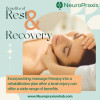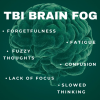Traumatic Brain Injury (TBI) is a serious medical condition that can have a profound impact on a person’s cognitive functions and overall well-being. One of the most common and distressing symptoms experienced by individuals with TBI is “brain fog.” In this comprehensive guide, we will delve into the intricate relationship between Traumatic Brain Injury and brain fog, shedding light on the causes, symptoms, management, and potential treatments.
What is Traumatic Brain Injury (TBI)?
Traumatic Brain Injury, often abbreviated as TBI, occurs when there is a sudden jolt or blow to the head that disrupts normal brain function. This can result from various incidents such as falls, car accidents, sports-related injuries, and physical assaults. TBI is classified into three severity levels: mild, moderate, and severe, each presenting unique challenges and symptoms.
Understanding Brain Fog
Brain fog is a term used to describe a range of cognitive symptoms that can follow a TBI. It is characterized by difficulties in concentration, memory, decision-making, and clear thinking. Individuals with brain fog often experience confusion, mental fatigue, and a sense of being mentally “cloudy.” This phenomenon can significantly impact daily life, making even simple tasks challenging to complete.
The Connection Between TBI and Brain Fog
The precise mechanism that links TBI to brain fog is complex and not yet fully understood. However, researchers believe that several factors contribute to this connection:
- Neuroinflammation: Following a TBI, the brain’s immune response may trigger inflammation, which can disrupt normal neural pathways and lead to cognitive impairments, including brain fog.
- Chemical Imbalances: TBI can lead to imbalances in neurotransmitters and hormones that play a crucial role in cognitive function. These imbalances may contribute to the development of brain fog.
- Structural Changes: The physical trauma associated with TBI can result in structural changes to the brain. These changes may interfere with communication between brain regions, affecting cognitive abilities.
Managing Brain Fog After TBI
Managing brain fog after a TBI requires a multifaceted approach that addresses both the physical and cognitive aspects of recovery. Here are some strategies that may help:
- Rest and Sleep: Adequate rest and quality sleep are essential for the brain’s healing process. Establish a consistent sleep schedule and create a restful sleep environment.
- Cognitive Rehabilitation: Engaging in cognitive rehabilitation exercises, under the guidance of a healthcare professional, can help improve memory, attention, and other cognitive functions.
- Nutrition and Hydration: A balanced diet rich in antioxidants, omega-3 fatty acids, and brain-supportive nutrients can aid in the brain’s recovery and reduce brain fog.
- Physical Activity: Light to moderate exercise, as approved by a medical professional, can stimulate blood flow to the brain and promote healing.
- Stress Management: Practice stress-reduction techniques such as meditation, deep breathing, and mindfulness to alleviate mental fatigue and promote mental clarity.
Potential Treatments and Future Directions
Research into the relationship between TBI and brain fog is ongoing, and advancements in medical science continue to offer hope for improved treatment options. Neurofeedback, pharmacological interventions, and cutting-edge therapies like transcranial magnetic stimulation (TMS) are being explored as potential ways to alleviate brain fog and enhance cognitive function.
Conclusion
Traumatic Brain Injury and the accompanying brain fog can have a profound impact on an individual’s quality of life. By understanding the underlying causes and implementing effective management strategies, those affected by TBI can take steps toward regaining cognitive clarity and returning to a more fulfilling and productive life. If you or a loved one are dealing with TBI-related brain fog, remember that seeking guidance from healthcare professionals is crucial in developing a tailored and effective recovery plan.


